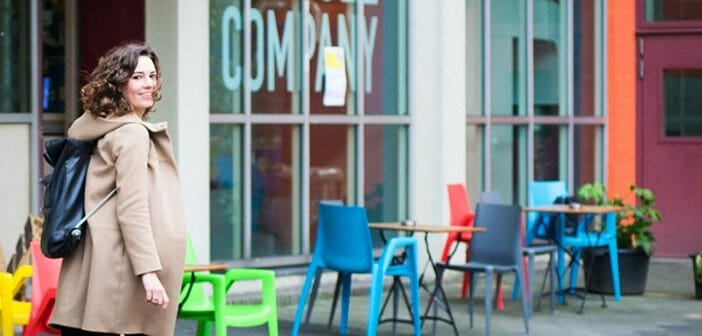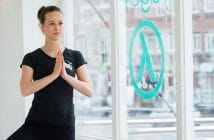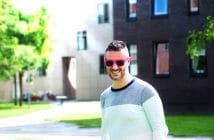Door: Inge Abraham
Who are the people behind Accenture? What drives and inspires Berend de Jong on a daily basis? How has Lisa Hartgring’s life, career, ambitions and dreams developed over the years? What difficult choices has Alejandra Lugard made in her life? Through a series of portraits, we answer these questions and introduce you to our people: those who make Accenture the thriving company that it is.
Introducing Laura van den Hurk, Talent Strategist Lead at Accenture Netherlands.
‘It all starts with curiosity: I have a natural interest in actively getting to know people. In the past, it was just something I managed to do without even realizing it. Now, as a talent strategist, it forms a very important part of my job. From curiosity to connection: I get to know somebody first, and from there, I start making connections.’
‘One of the things my job has taught me is to think out of the box. The more people I get to know, from various backgrounds and with different stories, the more I realize it doesn’t matter where you’re from or what you have been through: everybody has skills and talents. It’s funny: where people might see obstacles – often for very obvious reasons – I see possibilities. This motivates me to lead by example and show others it really is possible.’
Typical Middle Child Behavior
‘The fact that I’m a middle child – I have a younger and an older sister – might have something to do with it, too. We all know middle children are often more the mediating type. When I’m with family or with friends, I am often the person that connects other people or tries to find balance in the group. Just like in my job, the role fits me like a glove – it comes naturally to me. When I was a kid, I hated seeing other children being excluded and was determined to make them feel welcome. I simply didn’t deal well with injustice, and I still don’t today.’
‘When I was asked to join the group of colleagues that were going to work in a refugee camp in Lesbos for a week, I first had my doubts. Of course, I wanted to help, but what could I personally bring to the table? I’m not a professional caretaker, a doctor or a cook – I work for a global consultancy firm. I didn’t want to come across like a thrill-seeker. Eventually, it was my curiosity that made up my mind for me, and I joined the team. As a team, we decided that our main goal was to show the people we cared, because we knew very well we weren’t going to really change the situation. Just being there and helping out felt like the right thing to do.’
Once-In-A-Lifetime Experience
‘Looking back, that week was one of the most distinct times in my life. We worked in refugee camp Kara Tepe, where the most vulnerable families, elderly and children live – nearly a thousand residents. We organized activities for the children, made soup to hand out in the tents and made a point to simply connect.‘
‘For me, one of the most precious moments was when I was invited for lunch by a Yazidi man and his family; his brother, sister and 70-plus-year-old mother. They prepared chicken, rice and vegetables for me from the very little resources they had. For them, the fact that they could invite me for lunch filled them with pride and gave them the feeling life in the camp was normal, even just for that afternoon. We chatted – using hands and feet and helped by a translator. It’s an experience that I won’t forget anytime soon. Another night, we ended up around a fire with a group of women from different places – Africa, Syria and Iraq – who all brought something to eat or drink. We joined them, and slowly but surely the women, who normally were quite reserved, opened up to us and to each other. That mutual interest and and deep sense of community was a once-in-a-lifetime experience.’
The Strength to Make Something of Their Lives
‘The week in Lesbos brought about valuable insights, both positive and negative. The fact that people are so resilient was a definite positive eye-opener. People who risked their lives to flee war zones, got on a boat, walked 80km – children included – and still found the strength to make something of their lives, I deeply admire and was humbled by their will power. Not to mention, the dozens of volunteers who put their heart and soul into making a difference for these people.’
‘However, I also saw the flipside of the coin – especially in the other camp on the island, Moria, where conditions are harsh. The facilities are almost non-existent, it’s very unsafe, there’s barb wire all around the place; making it feel like a true prison. I was shocked to see how appalling this “gateway to Europe” really is, and how all human endeavors cannot change deeply rooted political systems. At the end of the day, we live in world filled with inequality in an unequal system.’
It’s one of the things I love most about my work: the fact that I truly believe there are many ways to make sure people can feel themselves and can show their potential.
We All Say ‘Bring Them in!’ (but Can We, Really?)
‘In my day-to-day job, it’s all about changing some of those injustices and implementing equality where possible. As Talent Strategist Lead, it’s my goal and wish to make sure all Accenture employees reach their true potential, and feel like they can be themselves at work. Inclusive employment for persons with poor job prospects is part of my responsibilities – and perfectly in line with my desire to connect people and make them feel valued.’
‘Ask any employee at Accenture if he or she feels we should give talents a chance, despite possible cultural differences, language barriers or physical disabilities, and the answer will be a collective ‘yes, bring them in!’ But when we look closely at processes and the culture in our organization, we need to admit we’re not quite there yet. Not just us, but many organizations still face challenges when it comes to a fully inclusive employment policy. For instance, simple, practical questions like: ‘Which type of role or career level do we provide for someone who might only produce 60% of deliverables compared to someone who consistently hits 100%? Should you offer someone with a chronic disease a different type of contract? It’s these types of interesting questions that make my job more challenging: there’s still a lot of work to do.’
The Impact Art Can Have on Diversity
‘It’s one of the things I love most about my work: the fact that I truly believe there are many ways to make sure people can feel themselves and can show their potential. Through art, for instance. We just launched a cool art exhibition on the 15th and 16th floor in our office in Amsterdam to increase awareness on inclusion. These portraits and paintings are created by artists with health obstacles, such as chronic illnesses or psychiatric diseases. I’m very proud of the display, but even more so of the impact it has: we’ve received a lot of feedback. Which is exactly the idea: for people to talk about it, be touched by it and for it to – hopefully – change their perspective on the world we live in.’
‘On a personal level, I also like to change my perspective regularly. It’s one of the reasons why since a few years, I “pick” a new hobby every year. The first year it was rock climbing; the second year I joined a workshop drawing and painting, followed by dance classes (jazz, modern and classical) and recently, I’ve started a course that will officially make me a nature guide in the Vondelpark in Amsterdam. I love learning new things, especially when the subject is close to me. As you can see, nature is a common denominator here, especially in this stage in my life, I feel nature is becoming increasingly important to me.’
‘It’s one of the reasons why I joined Accenture at the age of 24 – just out of university – their balanced focus on the 3 Ps: Profit, People and Planet. While currently my focus is mostly on the people, one day I hope to contribute more to the planet, too. I love working at an organization that gives me the opportunity to do just that – and truly have an impact.’
You can find more about Laura and her journey here.








